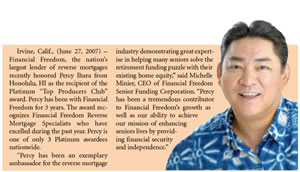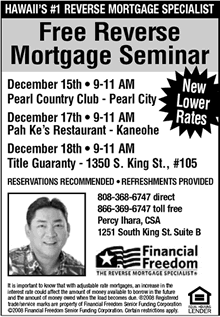Making an Educated Decision
By Percy Ihara
Reverse Mortgage Specialist
CAN A REVERSE MORTGAGE BE TAKEN OUT IF THERE ALREADY IS A CONVENTIONAL MORTGAGE ON THE HOME?
Yes, however, the existing mortgage must be paid off at closing. The proceeds from the reverse mortgage may be used for that purpose. This eliminates a monthly mortgage payment for the duration of the loan.

WHAT ABOUT A HOME IN A “REVOCABLE LIVING TRUST”?
A homeowner who has put the home in a revocable living trust can usually take out a reverse mortgage, subject to review of the trust documents. There are certain exceptions where we do allow “irrevocable trusts” on a case-by-case basis with restrictions.
WILL THERE BE ANY TAX LIABILITY FOR THE REVERSE MORTGAGE PROCEEDS?
Currently the Internal Revenue Service treats monies received from a reverse mortgage to be loan advances and not taxable income (consult your tax advisor).
CAN THE INTEREST CHARGED ON MY LOAN PRINCIPAL BE DEDUCTED FOR TAX PURPOSES?
Since you are not required to make any mortgage payments on a reverse mortgage the interest accrues and is deductible when the loan balance and interest are repaid after the borrower permanently leaves the property. You are allowed to make a mortgage payment of any amount at any time and the interest paid is deductible that tax year.

HOW DO THE MONIES FROM A REVERSE MORTGAGE AFFECT SOCIAL SECURITY OR MEDICARE BENEFITS?
The proceeds from a reverse mortgage do not affect these benefits.
WHAT ARE THE CLOSING COSTS ASSOCIATED WITH A REVERSE MORTGAGE?
The closing costs are similar to a conventional mortgage such as an origination fee, escrow fees, title insurance, appraisal and an insurance fee to HUD when applicable.
All of these fees can be financed as part of the initial loan advance with no out of pocket closing costs.
WHAT IS DUE WHEN THE LOAN IS REPAID?
The borrower pays back the cash advances they have received plus the accumulated interest and any fees/closing costs that were financed.

WHAT IF I OWE MORE THAN MY HOUSE IS WORTH?
All reverse mortgages are a “nonrecourse” loan, which means that the borrower can never owe more than the value of the home regardless of the loan balance.
DOES THE LENDER TAKE THE HOUSE?
This is a misconception; a reverse mortgage is merely a loan against the property. The title remains in the name of the borrower and the lender is only repaid the loan balance. ? When does the loan become due and payable?
The loan is due and payable when the borrower sells the property, permanently leaves the home, or passes away. In the case of a couple, it is the second to move out or die that triggers repayment. Until these events take place you live in the home and make no monthly payments to the lender.
DO MY HEIRS OR I HAVE TO SELL THE PROPERTY TO REPAY THE LOAN?
No, repayment can be accomplished by refinancing the existing reverse mortgage with a conventional mortgage loan.
Percy Ihara, CSA is the Reverse Mortgage Specialist and Certified Senior Advisor for Financial Freedom, the nations largest direct lender and servicer of reverse mortgages.
Mr. Ihara will be conducting four reverse mortgage seminars free to the public on:
* December 15 from 9-11a.m. at Pearl Country Club in Pearl City
* December 17 from 9-11a.m. at PahKe’s Restaurant in Kaneohe
* December 18 from 9-11a.m. at Title Guaranty on 1350 S. King St., #105
Healthcare, social workers, legal and financial advisors should also be aware of this emerging product for seniors and are encouraged to attend. If you would like a seminar on reverse mortgages for your group or organization you may call Mr. Ihara for future scheduling.
E-mail this story | Print this page |
Comments (0) | Archive |  | RSS
| RSS
Most Recent Comment(s):




 Del.icio.us
Del.icio.us











